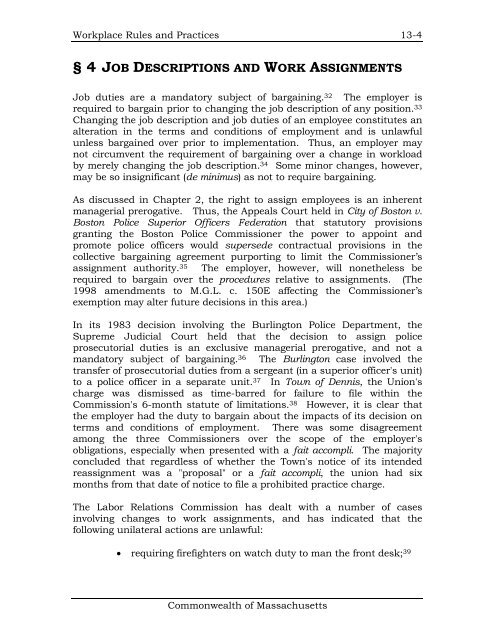Management Rights - AELE's Home Page
Management Rights - AELE's Home Page
Management Rights - AELE's Home Page
Create successful ePaper yourself
Turn your PDF publications into a flip-book with our unique Google optimized e-Paper software.
Workplace Rules and Practices 13-4<br />
§ 4 JOB DESCRIPTIONS AND WORK ASSIGNMENTS<br />
Job duties are a mandatory subject of bargaining. 32 The employer is<br />
required to bargain prior to changing the job description of any position. 33<br />
Changing the job description and job duties of an employee constitutes an<br />
alteration in the terms and conditions of employment and is unlawful<br />
unless bargained over prior to implementation. Thus, an employer may<br />
not circumvent the requirement of bargaining over a change in workload<br />
by merely changing the job description. 34 Some minor changes, however,<br />
may be so insignificant (de minimus) as not to require bargaining.<br />
As discussed in Chapter 2, the right to assign employees is an inherent<br />
managerial prerogative. Thus, the Appeals Court held in City of Boston v.<br />
Boston Police Superior Officers Federation that statutory provisions<br />
granting the Boston Police Commissioner the power to appoint and<br />
promote police officers would supersede contractual provisions in the<br />
colective bargaining agreement purporting to limit the Commissioner’s<br />
assignment authority. 35 The employer, however, will nonetheless be<br />
required to bargain over the procedures relative to assignments. (The<br />
1998 amendments to M.G.L. c. 150E afecting the Commissioner’s<br />
exemption may alter future decisions in this area.)<br />
In its 1983 decision involving the Burlington Police Department, the<br />
Supreme Judicial Court held that the decision to assign police<br />
prosecutorial duties is an exclusive managerial prerogative, and not a<br />
mandatory subject of bargaining. 36 The Burlington case involved the<br />
transfer of prosecutorial duties from a sergeant (in a superior officer's unit)<br />
to a police officer in a separate unit. 37 In Town of Dennis, the Union's<br />
charge was dismissed as time-barred for failure to file within the<br />
Commission's 6-month statute of limitations. 38 However, it is clear that<br />
the employer had the duty to bargain about the impacts of its decision on<br />
terms and conditions of employment. There was some disagreement<br />
among the three Commissioners over the scope of the employer's<br />
obligations, especially when presented with a fait accompli. The majority<br />
concluded that regardless of whether the Town's notice of its intended<br />
reassignment was a "proposal" or a fait accompli, the union had six<br />
months from that date of notice to file a prohibited practice charge.<br />
The Labor Relations Commission has dealt with a number of cases<br />
involving changes to work assignments, and has indicated that the<br />
following unilateral actions are unlawful:<br />
requiring firefighters on watch duty to man the front desk; 39<br />
Commonwealth of Massachusetts
















